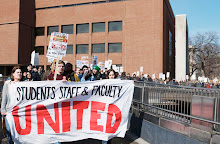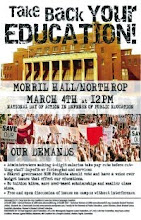There's a lot I could say about last Thursday's University Senate meeting, and maybe I'll say more in a future post. But for now, I'll simply offer the following quick observations:
At one point during the meeting, President Bruininks responded to the Troubled Waters controversy by offering a passionate (if sometimes self-contradictory) defense of academic freedom, and by insisting that the proper response to controversy is always to allow more speech, rather than less. So far, so good -- though that's bracketing out Bruininks' convoluted claim that he didn't want to blame anyone for the mistakes that were made, except that he wanted to remind everyone that it was allegedly faculty (and not his staff) who insisted that the film be banned ... and that he was disappointed that the public conversation about the controversy was unjustifiably uncivil, even though he took the time to lay on the invective for all those people who had judged Karen Himle too harshly before all the evidence was in. (Okay, that's a lot to bracket out, but stay with me for a moment here.)
At a different point in the meeting, however, when the Senate was discussing a proposed Conflict of Interest policy (itself a convoluted issue, since the U desperately needs such a thing, though the one that was on the table merely pretends to address the problem, rather than actually laying down a clear set of principles and an enforcement policy with real teeth), the parliamentarian in the room declared that the allotted time for discussion had run out. Granting more time for discussion would require a two-thirds majority vote to enact a temporary suspension of the Senate rules. That motion to extend discussion by a mere 15 minutes fell two votes short. But President "more speech, not less" certainly didn't speak up in favor of extending the conversation.
In fact, at a later point in the session, when another (admittedly less pressing) agenda item also ran out of the allotted discussion time, Bruininks pre-empted a vote on the question of extending the conversation by asking the assembly, "Do you really want more of this?"
And if "this" refers to open discussion of matters pressing enough to be brought before the University Senate in the first place, then the presumptive answer should be Yes. If there are still voices that want to be heard, then we should err in favor of more speech, not less.
Of course, of "this" refers to the genial bullying of the current administration (which is presumably not what Bruininks meant, of course, though perhaps it should have been), then the obvious answer is an emphatic No.
Subscribe to:
Post Comments (Atom)


On the items mentioned, as well as many others, the President seems to speak out of both sides of his mouth, e.g.:
ReplyDeleteBruininks Statement: 9/28
"As the facts surrounding the production of the film have become clearer, it was readily apparent to me that this is an issue of academic freedom; as a result, we immediately resolved to show it as planned."
source:
http://bit.ly/9zE98I
MPR 9/29
U of M President Robert Bruininks said talk of delaying the "Troubled Waters" documentary, which he admits should have been handled and communicated differently, never threatened academic freedom. "That was never at risk and never at stake," he said.
source:
http://bit.ly/b9O46L